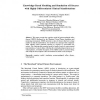Free Online Productivity Tools
i2Speak
i2Symbol
i2OCR
iTex2Img
iWeb2Print
iWeb2Shot
i2Type
iPdf2Split
iPdf2Merge
i2Bopomofo
i2Arabic
i2Style
i2Image
i2PDF
iLatex2Rtf
Sci2ools
AIME
2007
Springer
2007
Springer
Knowledge-Based Modeling and Simulation of Diseases with Highly Differentiated Clinical Manifestations
This paper presents the cognitive model of gastroesophageal reflux disease (GERD) developed for the Maryland Virtual Patient simulation and mentoring environment. GERD represents a class of diseases that have a large number of clinical manifestations. Our model at once manages that complexity while offering robust automatic function in response to open-ended user actions. This ontologically grounded model is largely based on script-oriented representations of causal chains reflecting the actual physiological processes in virtual patients. A detailed description of the GERD model is presented along with a high-level description of the environment for which it was developed.
| Added | 07 Jun 2010 |
| Updated | 07 Jun 2010 |
| Type | Conference |
| Year | 2007 |
| Where | AIME |
| Authors | Marjorie McShane, Sergei Nirenburg, Stephen Beale, Bruce Jarrell, George Fantry |
Comments (0)

